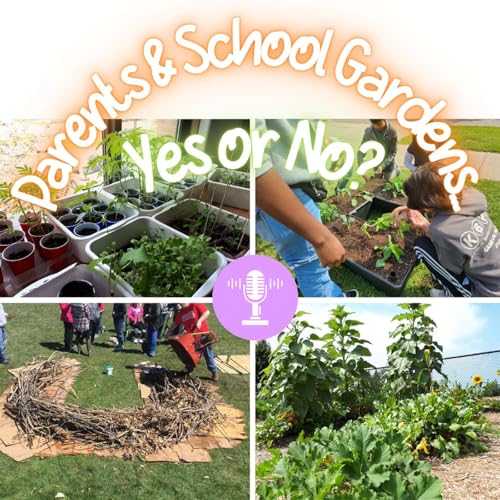Send us a text
What if you didn’t need raised beds, irrigation systems, or expensive equipment to start a school garden?
In the first episode of Season 3, Leila Mireskandari—founder of Kids Growing City and longtime school-garden educator—shares why successful school gardens don’t begin outdoors. They begin in the classroom.
After growing school gardens full-time for more than a decade, Leila explains a simple but powerful truth: school gardens are taught into existence. Instead of pouring energy and money into building outdoor infrastructure first, educators can start by teaching students how to grow food from seed—using minimal supplies and curriculum-aligned lessons.
Who This Episode Is For
This episode is for anyone who cares about school gardens—teachers, principals, parents, community partners, and school leaders. But most of all, it speaks directly to educators who want to lead a garden program that lasts and truly supports learning.
Why Most School Gardens Start in the Wrong Place
Leila challenges the assumption that schools must build a garden before teachers can use it.
Unlike a gym or science lab, a garden is not a finished facility that appears overnight. Designing, planting, maintaining, and harvesting food are themselves the lessons. When schools invest heavily in outdoor beds first, they often face burnout, budget strain, and long-term maintenance problems.
Instead, Leila argues that growing food should begin with seeds, observation, and hands-on classroom learning—long before shovels hit the soil.
What You Actually Need to Start
Forget grow towers and hydroponics systems.
To begin a classroom garden, Leila says you only need:
- Seeds
- Potting soil
- A sunny window
- Buckets or seed-starting cups
- Simple craft supplies
- A planting schedule for your growing zone
- Lesson plans that connect gardening to curriculum
With these basics, students can grow an impressive amount of food indoors while developing scientific thinking, responsibility, and confidence.
Teachers Are the Key to Successful School Gardens
A central message of the episode is that school gardens thrive when they are:
- Led by teachers
- Embedded in curriculum
- Built and grown by students
- Supported—rather than driven—by administrators, parents, and community partners
Community gardens on school grounds can be wonderful, Leila explains, but instructional school gardens depend on educators taking the lead.
The Two-Phase Approach: Classroom First, Outdoors Later
Leila introduces her two-phase framework for sustainable school gardens.
Phase 1 focuses on the classroom. Students learn to germinate seeds, care for seedlings, and grow fast-maturing crops that can be harvested before summer. Longer-season plants can be sent home, donated, or used for fundraising when school ends.
Phase 2 comes later. Often in a second year, schools expand outdoors to tackle garden design, bed building, transplanting, and summer maintenance systems. Trying to do everything at once, Leila notes, is what overwhelms many programs.
The Oasis Program Series Is Now Open
Leila shares that enrollment is open for 2026 in her
👉 Oasis Program Suite
including Oasis Classroom and outdoor garden lesson packages, along with the School Gardens with Ease Logistics class.
These programs provide done-for-you lesson plans and step-by-step systems so teachers can grow thriving gardens with confidence.
In this episode, you’ll learn how to start a school garden with minimal supplies, build skills before investing in infrastructure, and grow a classroom
 13 分
13 分 17 分
17 分 13 分
13 分 7 分
7 分 6 分
6 分 7 分
7 分 16 分
16 分 2025/10/056 分
2025/10/056 分
